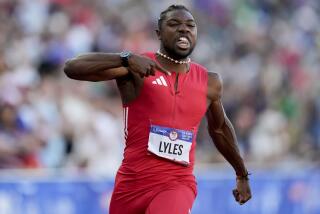Wallace Spearmon Jr. aims to re-enter Olympic fast lane in London
- Share via
Four years is not long enough to forget. Not nearly long enough.
It was the 2008 Beijing Olympics and Wallace Spearmon Jr. had just finished third in the 200 meters behind his pal, Usain Bolt. At least, he thought he had.
Taking a victory jog around the track, with the American flag draped across his shoulders and photographers snapping pictures, Spearmon noticed Bolt’s agent running toward him.
“Wallace,” the agent said, “you’re disqualified.”
“Me?”
“You.”
Spearmon had stepped out of his lane coming around the turn, an infraction barely noticeable on film, yet grounds for losing his bronze medal in a race that also saw the second-place finisher, Churandy Martina of the Netherlands Antilles, disqualified for a similar violation.
“I’m not going to lie — I didn’t hold my composure all that well,” Spearmon said. “I was heartbroken.”
The pain lingered as he came home to Texas, the sprinter figuring he had only one option.
“I just kept do what I always do,” he says. “What I know.”
That would be running. And setting his sights on the 2012 London Olympics.
The 27-year-old comes from a track family, his father a two-time All-American at Arkansas and a 200-meter bronze medalist at the 1987 Pan American Games.
“Growing up, my teacher asked me what I wanted to be,” he recalled. “I said I wanted to be an Olympian and she said, ‘No, choose something realistic.’”
Following in his dad’s footsteps, he won a pair of NCAA 200-meter titles for the Razorbacks before leaving college early to pursue a professional career. From 2005 through ‘09, his resume grew to include two bronzes and a silver at the world championships.
Still, as veteran sprinter Doc Patton said, “What every athlete wants is an Olympic medal.”
So the disappointment of Beijing was not easily dismissed, and the years that followed were anything but smooth.
Spearmon had been battling a knee injury before those Games and needed surgery shortly afterward. Trying to come back too quickly, he injured his Achilles’ tendon.
That required more visits to the doctor, along with dozens of X-rays and MRI exams.
“Sprinters are like Ferraris,” he said. “The smallest injury can take you out.”
Running with pain eventually caused him to alter his natural, fluid stride. His motion began to favor one side, his arms crossing his body as he raced down the track.
With an Olympic year fast approaching, Spearmon decided to make a change. Moving from College Station, Texas, to Dallas, he began training with Patton and longtime coach Monte Stratton.
The goal was to get healthy and return to his original running style. So far, the early returns have been promising.
This season started with a 19.95-second win at the Bobby Lane Invitational in Arlington, Texas. It was the earliest any runner had gone sub-20 seconds outdoors in the Northern Hemisphere.
In all, Spearmon owns two of the five fastest 200-meter times in the world this year.
“He’s probably in the best shape he’s ever been in,” said Patton, who will try to make the U.S. team in the 100 meters. “He’s running lights out.”
But one more test stands between Spearmon and London — the U.S. trials. Even for a favorite, there is no guarantee of finishing in the top three and qualifying for the team.
“You can be in shape, mentally and physically,” Spearmon said. “If the slightest thing goes wrong, that’s the end of your Olympic dreams.”
For all the determination he has shown over the past four years, the sprinter concedes that he still hasn’t gotten over what happened in 2008.
The memories of that day at Beijing’s National Stadium remain all too clear, Spearmon arguing with Chinese officials over a grainy photograph that — from his point of view — did not clearly show a violation. Then came videotape that made the misstep more obvious.
“You look back on Beijing … what place is a disqualification?” he asked. “It’s like I didn’t even race.”
Spearmon figures that a medal in London is the only way to soothe the pain. Four years isn’t long enough to forget, but it’s enough time to plan for a shot at redemption.
twitter.com/LATimesWharton
More to Read
Go beyond the scoreboard
Get the latest on L.A.'s teams in the daily Sports Report newsletter.
You may occasionally receive promotional content from the Los Angeles Times.











